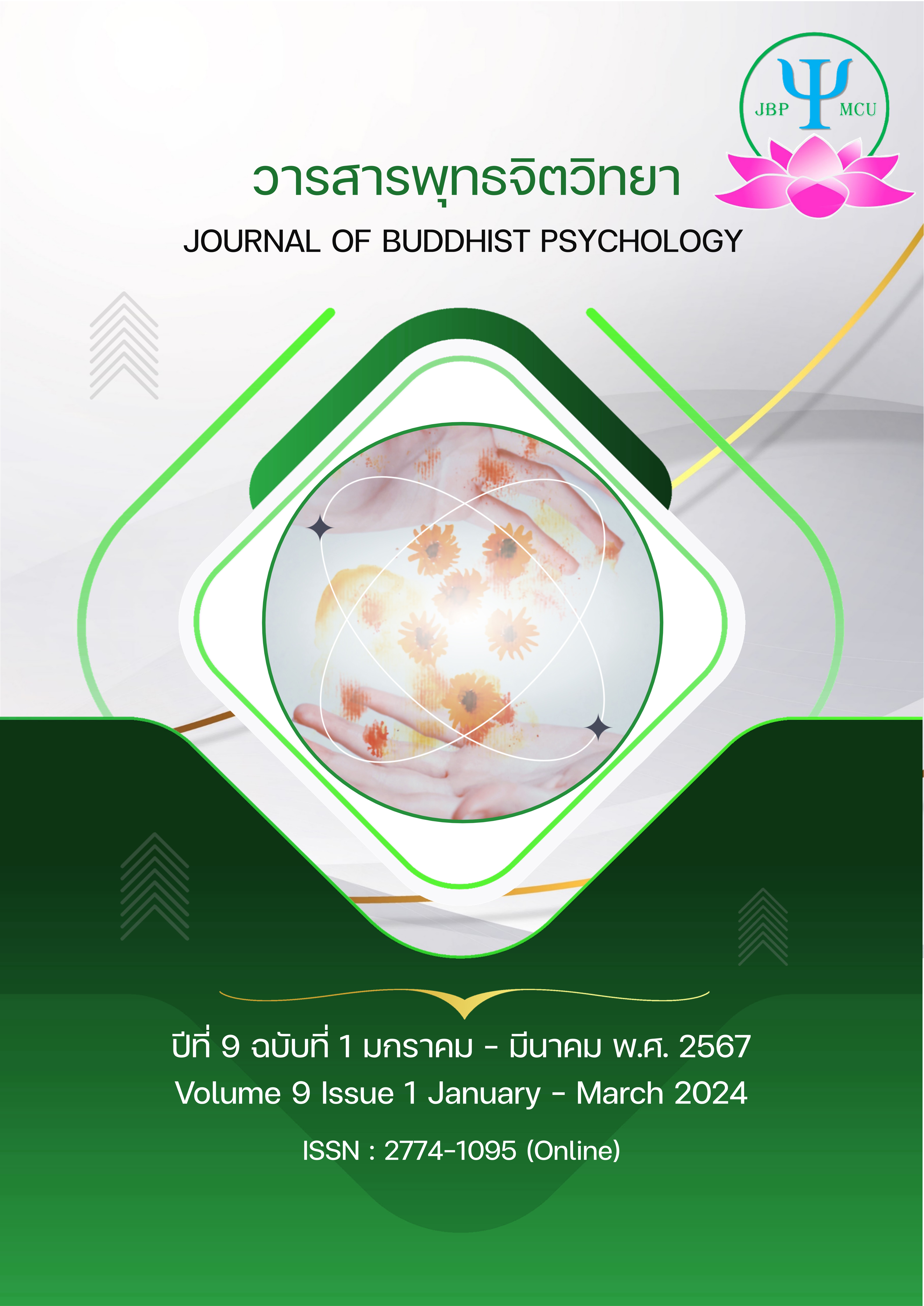Buddhist Psychology Based on The Meditation Instructor Training Course of Somdet Phra Nyannavajirodom (Viriyang Sirintharo) For Holistic Well-Being Creation
Main Article Content
Abstract
The objectives of this research are 1) to study and analyze the characteristics and elements of the Buddhist psychology model, 2) to synthesize the elements or factors related to the Buddhist psychology model, and 3) to present the Buddhist psychology model according to teaching principles of Meditation Teacher Course of Somdej Phra Nyan Vajirodom (Wiriyang Sirindhorn) to promote holistic health. It is a qualitative research method. The data were Collected from 21 meditation experts/persons by using Purposive Sampling according to specified characteristics and snowball sampling, using in-depth interviews to collect data. The tools used in this research consisted of 3 formats as follows: 1. In Depth Interview 2. Focus Group question 3. Connoisseurship.
The research results were found that
1. The outstanding Characteristics and elements according to the teaching method of the meditation teacher curriculum of Somdet Phra Nyanavajirodom (Wiriyang Sirindhorn) 5 important aspects are 4 aspects of overall health, willpower, Right Concentration, Hi-Tech Meditation and teaching methods for the meditation teacher curriculum of Somdet Phra Nyanavajirodom (Wiriyang Sirindhorn).
2. The 3 Dhamma principles are the core of Buddhism, namely pariyati, patibat, and pativet, teaching guidelines for the meditation teacher curriculum of Somdej Phra Nyanavajirodom (Viriyang Sirindhorn) as “Buddha wisdom”. The principles of 4 perseverance or 4 pathana are the principles of sammapadhana: saṅvarapadhana (perseverance in prevention), pahanapadhana (perseverance in correction), bhavānapadhana (perseverance in development), anurakkhanapadhana (perseverance in maintaining it sustainably), Upadakamanasikāra (Thinking in merit), mentions that upādakamanasikāra is the cause of consciousness. To do good or speak well and have good words, one firstly must begin with good thoughts or meritorious thoughts according to the teaching methods of the meditation teacher course of Somdet Phra Nyan Vajirodom (Wiriyang Sirindhorn), that suitable for people of all genders and ages. One who want to study in depth need to have knowledge and understanding of both Deep samatha vipassana and meditation, those are the meditation one should practice to reach nippitañāna and intuition or insight (The actually perception of knowledge arises). it is called having Dhamma Eyes in the four truths: paramattha dhamma, mind, mental factors, form, and nirvana.
3. A model of Buddhist psychology according the teaching methods of the meditation teacher curriculum of Somdej Phra Nyanvajirodom (Wiriyang Sirindhorn) to promote overall health; to create 3 types of wisdom: Sutamayapanya (deep knowledge), wisdom that comes from listening to the teachings In the content of the meditation teacher curriculum, Jintāmaya-pannya (practical knowledge) is the wisdom that comes from Yonisomanasikāra. and Bhavanamayayapanya (true knowledge) is wisdom from the practice of samatha and vipassana.
Article Details

This work is licensed under a Creative Commons Attribution-NonCommercial-NoDerivatives 4.0 International License.
References
กัญญาวีร์ ธัญญารัชตะ. (2564). การฝึกสมาธิตามแนวสติปัฏฐาน 4 ที่มีผลต่อการควบคุมตนเองของผู้เข้าร่วมปฏิบัติธรรม. วารสารพุทธจิตวิทยา, 6(2), 97-103.
กัลป์ยกร ลาภเดโช และสมบูรณ์ สุขสำราญ. (2565). บทบาทพระสงฆ์กับการพัฒนาสังคมไทย. วารสารมณีเชษฐาราม วัดจอมมณี, 5(1), 1-16.
นภัทร์ แก้วนาค. (2555). เทคนิคการวิเคราะห์ข้อมูลเชิงคุณภาพ (Qualitative Data Analysis Technic) (QDAT Knowledge). เอกสารประกอบการสอนหลักสูตรดุษฎีบัณฑิต. กรุงเทพฯ: มหาวิทยาลัยศรีนครินทรวิโรฒประสานมิตร.
พระพรหมบัณฑิต. (2564). พุทธจิตวิทยากับศาสตร์สมัยใหม่พัฒนาจิตใจของมนุษย์. เอกสารถอดเทปจากคำบรรยาย. วันไหว้ครู. เสาร์ 14 สิงหาคม.
พระครูพิจิตรวรเวท (มานัส มารยาท) และพระมหาสุเมฆ สมาหิโต. (2565). การประยุกต์ใช้หลักสัมมัปปธาน 4 เพื่อการอนุรักษ์วัฒนธรรมของชาติ. วารสารวิจยวิชาการ, 5(1), 273-284.
พระครูภาวนาสังวรกิจ วิ. (สุวิทย์ คำมูล). (2561). การพัฒนาสุขภาวะองค์รวมสำหรับผู้สูงวัยตามแนวพุทธจิตวิทยา (ดุษฎีนิพนธ์พุทธศาสตรดุษฎีบัณฑิต). มหาวิทยาลัยมหาจุฬาลงกรณราชวิทยาลัย.
พระครูวินัยธรศิริเชษฐ์ สิริวฑฺฒโน. (2564). การพัฒนาจิตใจมนุษย์โดยใช้หลักสติปัฏฐาน 4. มจร. เลย ปริทัศน์. 2(2), 136-149.
พระครูสิริรัตนานุวัตร, พระมหาไกรสร โชติปัญโญ, ประยูร สุยะใจ, อนันต์ อุปสอด, สานุ มหัทธนาดุลย์, (2559). รูปแบบและกระบวนการเสริมสร้างสุขภาวะองค์รวมของครอบครัวและสังคม (รายงานวิจัย). มหาวิทยาลัยมหาจุฬาลงกรณราชวิทยาลัย.
ปริศนา ไกรวิทย์. (2559). การประยุกต์ใช้หลักสมาธิในการดำเนินชีวิตของครูสอนสมาธิ (ดุษฎีนิพนธ์พุทธศาสตรดุษฎีบัณฑิต). มหาวิทยาลัยมหามกุฏราชวิทยาลัย.
องค์การอนามัยโลก. (2560). การส่งเสริมสุขภาพจิต: แนวคิด หลักฐาน และแนวทางปฏิบัติ. เชียงใหม่: วนิดาการพิมพ์.
มติคณะรัฐมนตรี. (2562). แนวทางและมาตรการแก้ไขปัญหาฝุ่นละอองขนาดเล็ก (PM2.5) ในกรุงเทพมหานคร/ปริมณฑล และในพื้นที่จังหวัดต่าง ๆ. สืบค้นเมื่อ 27 เมษายน 2564, จาก https://www.ryt9.com/s/cabt/2950136
Investment Reader. (2562). ทำความรู้จักกับการปฏิวัติอุตสาหกรรมครั้งที่ 4: รวดเร็วและ disrupt ในวงกว้างกว่าครั้งไหน ๆ. สืบค้นเมื่อ 27 เมษายน 2564, จาก https://www.finnomena.com/ investment-reader/4ir/
Peer Power Team. (2562). Digital Disruption การเปลี่ยนแปลงและการปรับตัว. สืบค้นเมื่อ 27 เมษายน 2564, จาก https://www.peerpower.co.th/blog/investor/analysis/digital-disruption
John F. Helliwell, Haifang Huang, Shun Wang, Max Norton. (2021). Happiness, Trust and Deaths under COVID-9,World happiness report. Retrieved April 27, 2021, from https://worldhappiness.report/ed/2021/happiness-trust-and-deaths-under-covid-19
Macmillan, T.T. (1971). The Delphi Technique. Paper Presented at the annual meeting of the California Junior Colleges Associations Committee on Research and Development, Monterey, California. (May 1971), 3-5.


